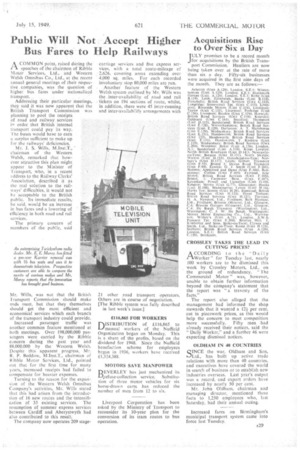Public Will Not Accept Higher Bus Fares to Help Railways
Page 7

If you've noticed an error in this article please click here to report it so we can fix it.
A COMMON point, raised during the 1-1 speeches of the chairmen of Ribble Motor Services, Ltd.. and' Western Welsh Omnibus Co., Ltd., at the recent annual general meetings of ,their respective .companies, was the question of higher bus fares under nationalized
transport. .
Addressing their particular Meetings, they said it was now apparent that the British Transport Commission was planning to pool the receipts of road and railway, services in order that British internal transport could pay its way. The buses would have to earn a surplus sufficient to make up for the railways' deficiencies.
Mr. J. S. Wills, .M.Inst.T., chairman of the Western Welsh, remarked that however attractive this plan might appear to the Minister of Transport, who, in a recent address to the Railway Clerks' Association, described it as the real solution to the 'railways' difficulties, it would not be acceptable to the British public. Its immediate results, he said, would be an increase in bus tares and a lowering of efficiency in both road and rail services.
The primary concern of members of the public, said Mr. Wills, was not that the British Transport Commission should make ends meet, but that they themselves should get the most efficient and economical services which each branch of the transport industry could provide.
Increased passenger traffic was another common feature mentioned at both meetings. Over 198,000,000 passengers were carried by the Ribble concern during the past year and 88,000,000 by the Western Welsh. Despite this apparent progress, Mr. R. P. Beddow, MInst.T., chairman of Ribble Motor Services, Ltd., pointed out that for the first time for many years, increased receipts had failed to compensate for heavier expenses.
Turning to the reason for the expansion of the Western Welsh Omnibus Company's activities, Mr. Wills stated that this had arisen, from the introduction of 16 new routes and the intensiftCation of 33 existing services. The resumption of summer express services between Cardiff and Aberystwyth had also contributed to this result.
The company now operates 209 stage
carriage services and five express services, with a total route-mileage of : 2,626, covering areas extending over 4,000 sq. miles. For each recorded involuntary stop 80,000 miles are run. Another feature of the Western Welsh system outlined by Mr. Wills was the inter-availability, of rOad and rail tickets on 194 sections of route, whilst, in addition, there were 45 inter-running and inter-availability arrangements with 21 other road transport operators. Others are in course of negotiation. [The Ribble system was fully described in last week's issue.] £116,865 FOR WORKERS
DISTRIBUTION of £116,865. to manual workers of the Nuffield Organization began on Monday. This is a share of the profits, based on the dividend for 1948, Since the Nuffield benefaction scheme for employees began in [936, workers have received £1,324,388.
MOTORS SAVE MANPOWER
DEVERLEY has just mechanized its
.refuse-collection service. Substitution of three motor vehicles for six horse-drawn carts has reduced the number of men from 12 to six.
Liverpool Corporation has been asked by the Ministry of Transport to reconsider its 10-year plan for the conversion of its tram routes to bus operation.


























